A Study of Leadership Pedagogy in Louisiana Nursing Education
VerifiedAdded on 2023/06/05
|167
|50158
|340
Thesis and Dissertation
AI Summary
This dissertation investigates leadership pedagogy within Louisiana's baccalaureate nursing programs, addressing the gap between recommended leadership competencies and actual preparedness of nursing graduates. The study uses a qualitative approach, interviewing nursing faculty to understand their teaching strategies and perspectives on leadership education. Key findings reveal themes related to course purpose, teaching methods, student learning styles, evidence-based practice, and leadership efficacy. The research suggests that active learning and reflective practice can positively influence undergraduate nursing education, enabling students to develop leadership competence before entering practice. This study emphasizes the potential for social change by improving leadership preparation in nursing, ultimately impacting the healthcare environment. The research employs Corbin and Strauss's grounded theory approach for data analysis, identifying themes that highlight the importance of experiential learning and reflection in leadership development.
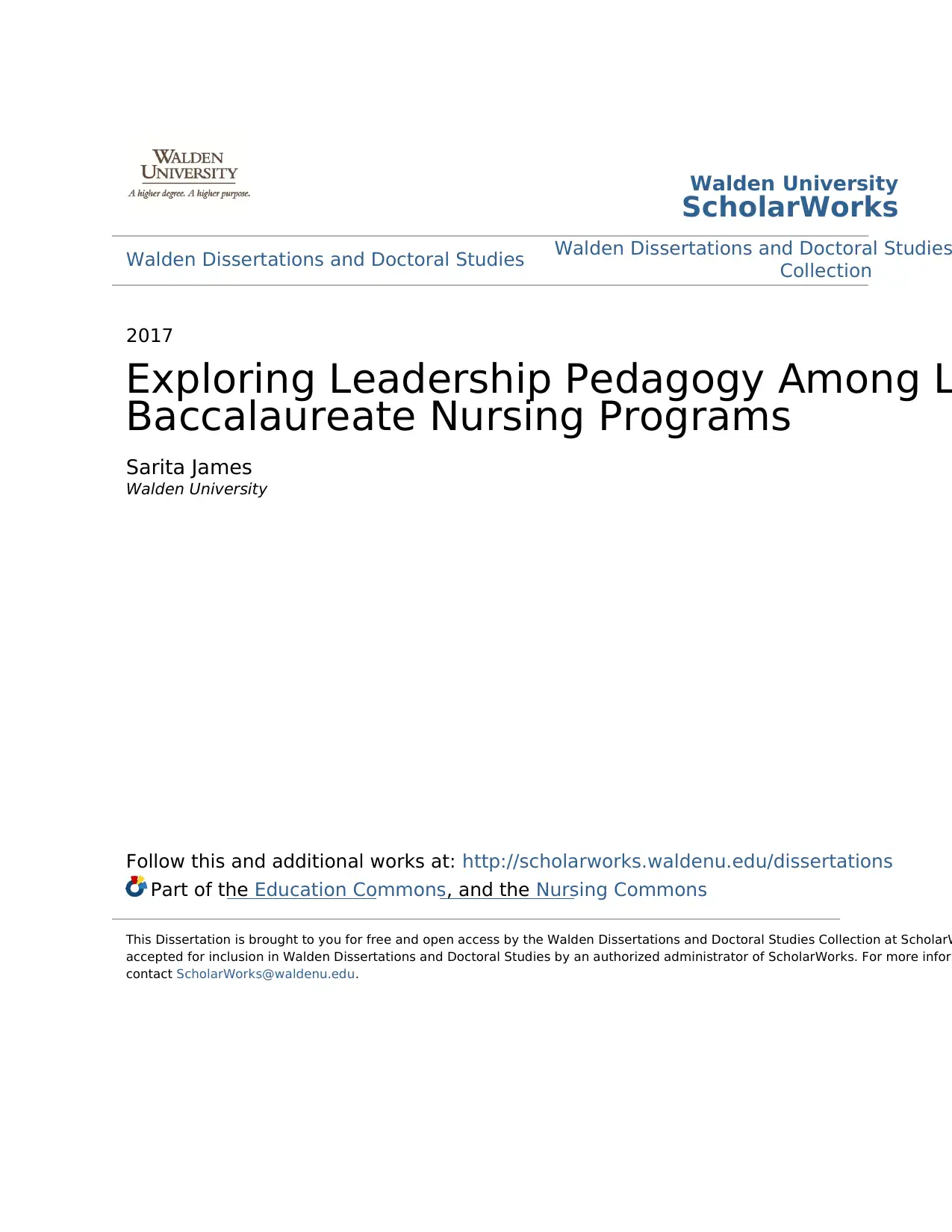
Walden University
ScholarWorks
Walden Dissertations and Doctoral Studies Walden Dissertations and Doctoral Studies
Collection
2017
Exploring Leadership Pedagogy Among L
Baccalaureate Nursing Programs
Sarita James
Walden University
Follow this and additional works at: http://scholarworks.waldenu.edu/dissertations
Part of the Education Commons, and the Nursing Commons
This Dissertation is brought to you for free and open access by the Walden Dissertations and Doctoral Studies Collection at ScholarW
accepted for inclusion in Walden Dissertations and Doctoral Studies by an authorized administrator of ScholarWorks. For more inform
contact ScholarWorks@waldenu.edu.
ScholarWorks
Walden Dissertations and Doctoral Studies Walden Dissertations and Doctoral Studies
Collection
2017
Exploring Leadership Pedagogy Among L
Baccalaureate Nursing Programs
Sarita James
Walden University
Follow this and additional works at: http://scholarworks.waldenu.edu/dissertations
Part of the Education Commons, and the Nursing Commons
This Dissertation is brought to you for free and open access by the Walden Dissertations and Doctoral Studies Collection at ScholarW
accepted for inclusion in Walden Dissertations and Doctoral Studies by an authorized administrator of ScholarWorks. For more inform
contact ScholarWorks@waldenu.edu.
Paraphrase This Document
Need a fresh take? Get an instant paraphrase of this document with our AI Paraphraser
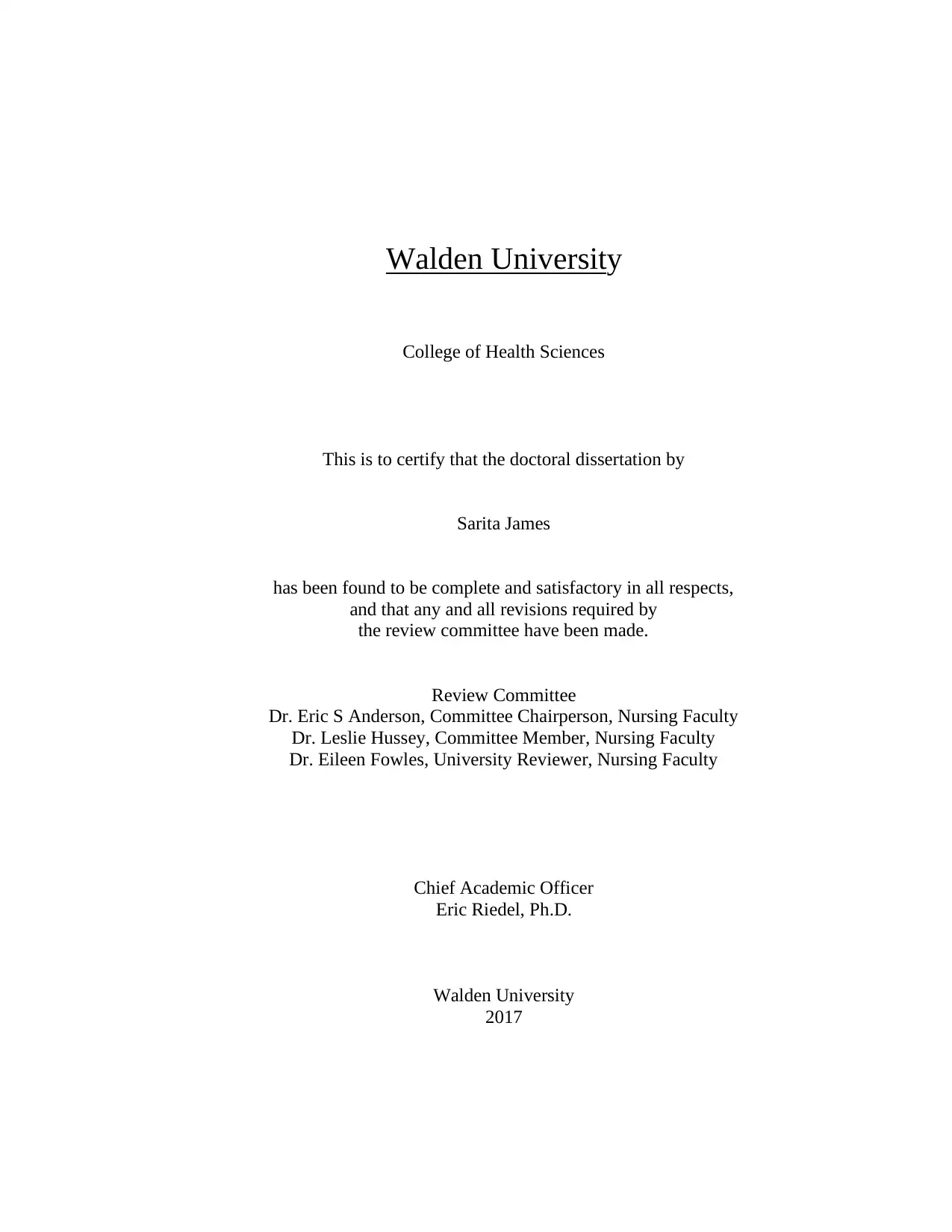
Walden University
College of Health Sciences
This is to certify that the doctoral dissertation by
Sarita James
has been found to be complete and satisfactory in all respects,
and that any and all revisions required by
the review committee have been made.
Review Committee
Dr. Eric S Anderson, Committee Chairperson, Nursing Faculty
Dr. Leslie Hussey, Committee Member, Nursing Faculty
Dr. Eileen Fowles, University Reviewer, Nursing Faculty
Chief Academic Officer
Eric Riedel, Ph.D.
Walden University
2017
College of Health Sciences
This is to certify that the doctoral dissertation by
Sarita James
has been found to be complete and satisfactory in all respects,
and that any and all revisions required by
the review committee have been made.
Review Committee
Dr. Eric S Anderson, Committee Chairperson, Nursing Faculty
Dr. Leslie Hussey, Committee Member, Nursing Faculty
Dr. Eileen Fowles, University Reviewer, Nursing Faculty
Chief Academic Officer
Eric Riedel, Ph.D.
Walden University
2017
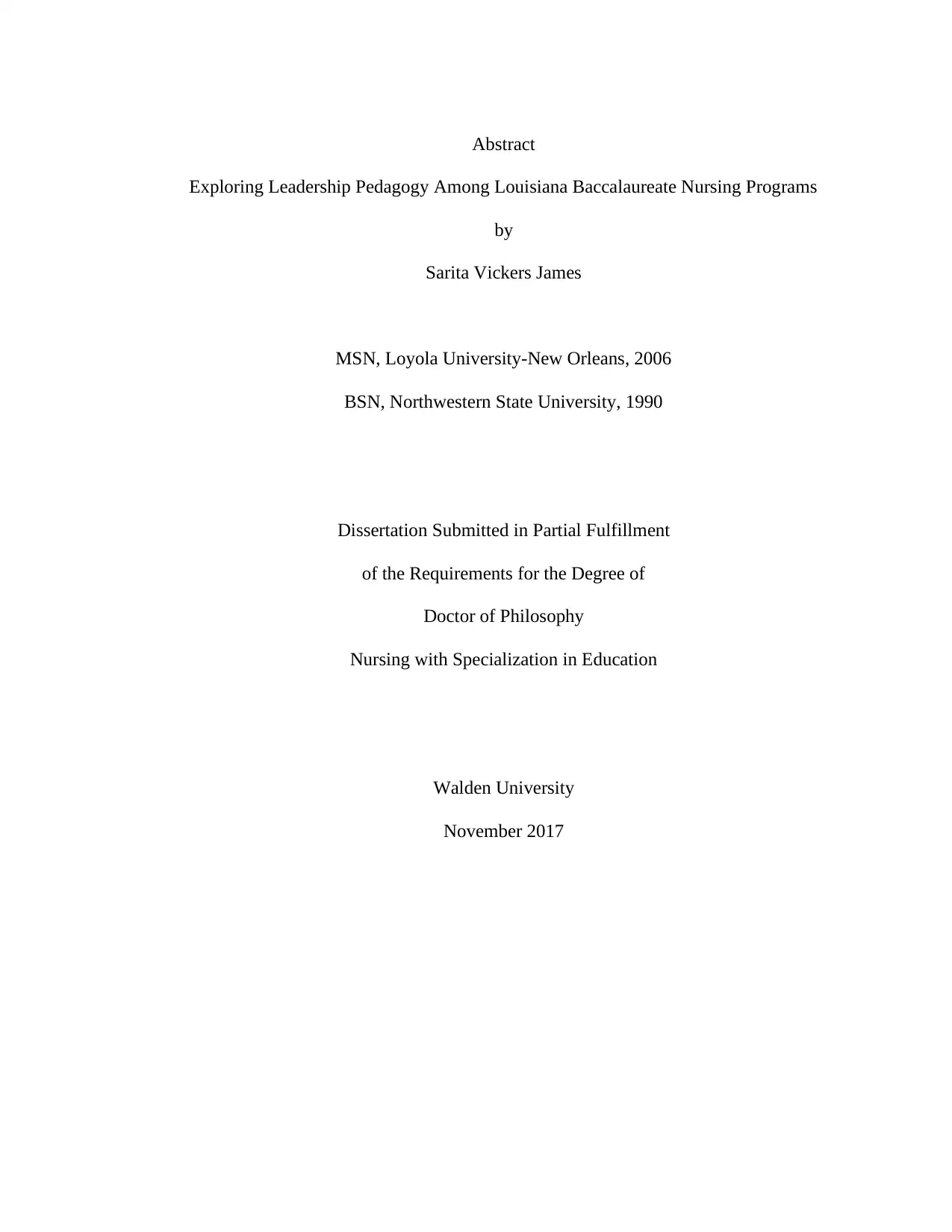
Abstract
Exploring Leadership Pedagogy Among Louisiana Baccalaureate Nursing Programs
by
Sarita Vickers James
MSN, Loyola University-New Orleans, 2006
BSN, Northwestern State University, 1990
Dissertation Submitted in Partial Fulfillment
of the Requirements for the Degree of
Doctor of Philosophy
Nursing with Specialization in Education
Walden University
November 2017
Exploring Leadership Pedagogy Among Louisiana Baccalaureate Nursing Programs
by
Sarita Vickers James
MSN, Loyola University-New Orleans, 2006
BSN, Northwestern State University, 1990
Dissertation Submitted in Partial Fulfillment
of the Requirements for the Degree of
Doctor of Philosophy
Nursing with Specialization in Education
Walden University
November 2017
⊘ This is a preview!⊘
Do you want full access?
Subscribe today to unlock all pages.

Trusted by 1+ million students worldwide
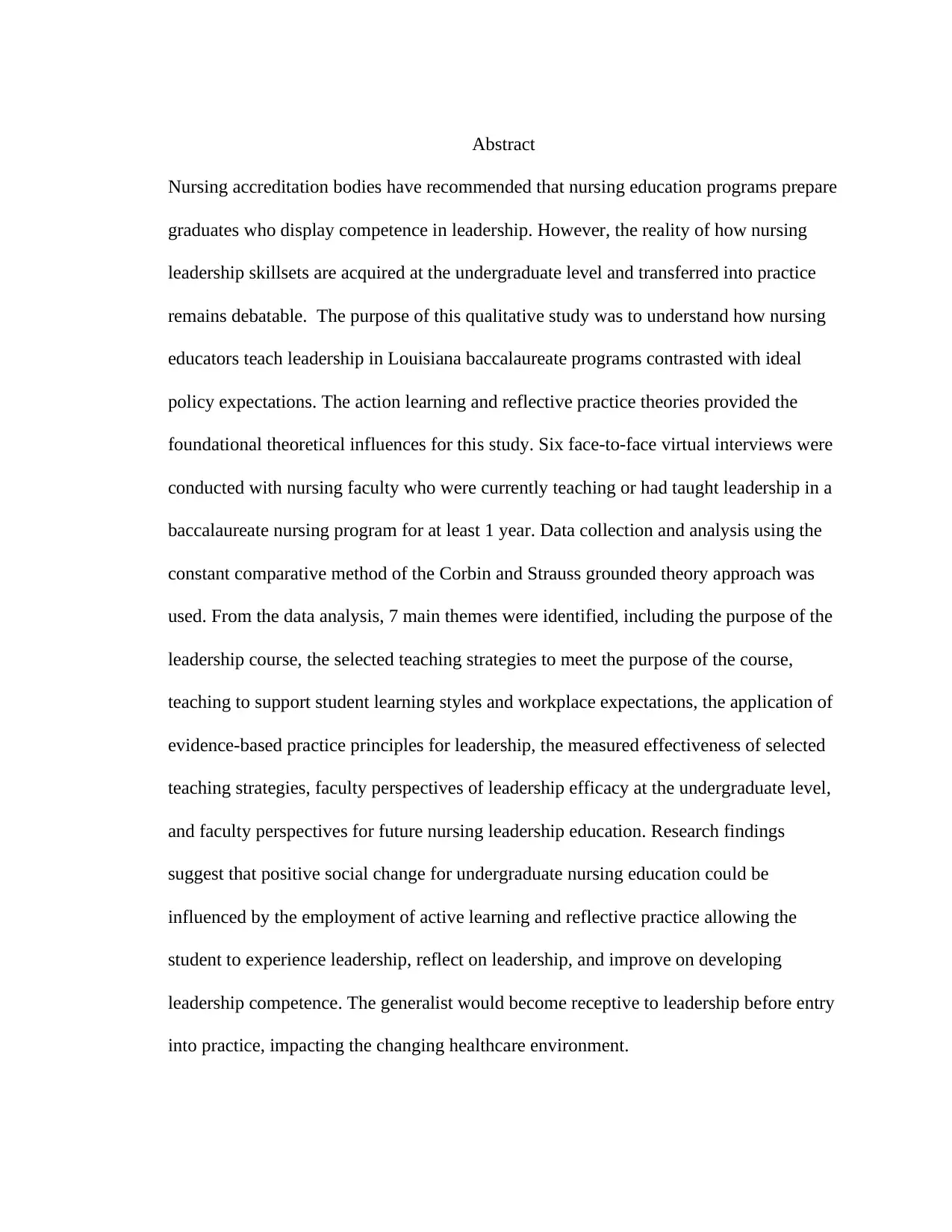
Abstract
Nursing accreditation bodies have recommended that nursing education programs prepare
graduates who display competence in leadership. However, the reality of how nursing
leadership skillsets are acquired at the undergraduate level and transferred into practice
remains debatable. The purpose of this qualitative study was to understand how nursing
educators teach leadership in Louisiana baccalaureate programs contrasted with ideal
policy expectations. The action learning and reflective practice theories provided the
foundational theoretical influences for this study. Six face-to-face virtual interviews were
conducted with nursing faculty who were currently teaching or had taught leadership in a
baccalaureate nursing program for at least 1 year. Data collection and analysis using the
constant comparative method of the Corbin and Strauss grounded theory approach was
used. From the data analysis, 7 main themes were identified, including the purpose of the
leadership course, the selected teaching strategies to meet the purpose of the course,
teaching to support student learning styles and workplace expectations, the application of
evidence-based practice principles for leadership, the measured effectiveness of selected
teaching strategies, faculty perspectives of leadership efficacy at the undergraduate level,
and faculty perspectives for future nursing leadership education. Research findings
suggest that positive social change for undergraduate nursing education could be
influenced by the employment of active learning and reflective practice allowing the
student to experience leadership, reflect on leadership, and improve on developing
leadership competence. The generalist would become receptive to leadership before entry
into practice, impacting the changing healthcare environment.
Nursing accreditation bodies have recommended that nursing education programs prepare
graduates who display competence in leadership. However, the reality of how nursing
leadership skillsets are acquired at the undergraduate level and transferred into practice
remains debatable. The purpose of this qualitative study was to understand how nursing
educators teach leadership in Louisiana baccalaureate programs contrasted with ideal
policy expectations. The action learning and reflective practice theories provided the
foundational theoretical influences for this study. Six face-to-face virtual interviews were
conducted with nursing faculty who were currently teaching or had taught leadership in a
baccalaureate nursing program for at least 1 year. Data collection and analysis using the
constant comparative method of the Corbin and Strauss grounded theory approach was
used. From the data analysis, 7 main themes were identified, including the purpose of the
leadership course, the selected teaching strategies to meet the purpose of the course,
teaching to support student learning styles and workplace expectations, the application of
evidence-based practice principles for leadership, the measured effectiveness of selected
teaching strategies, faculty perspectives of leadership efficacy at the undergraduate level,
and faculty perspectives for future nursing leadership education. Research findings
suggest that positive social change for undergraduate nursing education could be
influenced by the employment of active learning and reflective practice allowing the
student to experience leadership, reflect on leadership, and improve on developing
leadership competence. The generalist would become receptive to leadership before entry
into practice, impacting the changing healthcare environment.
Paraphrase This Document
Need a fresh take? Get an instant paraphrase of this document with our AI Paraphraser
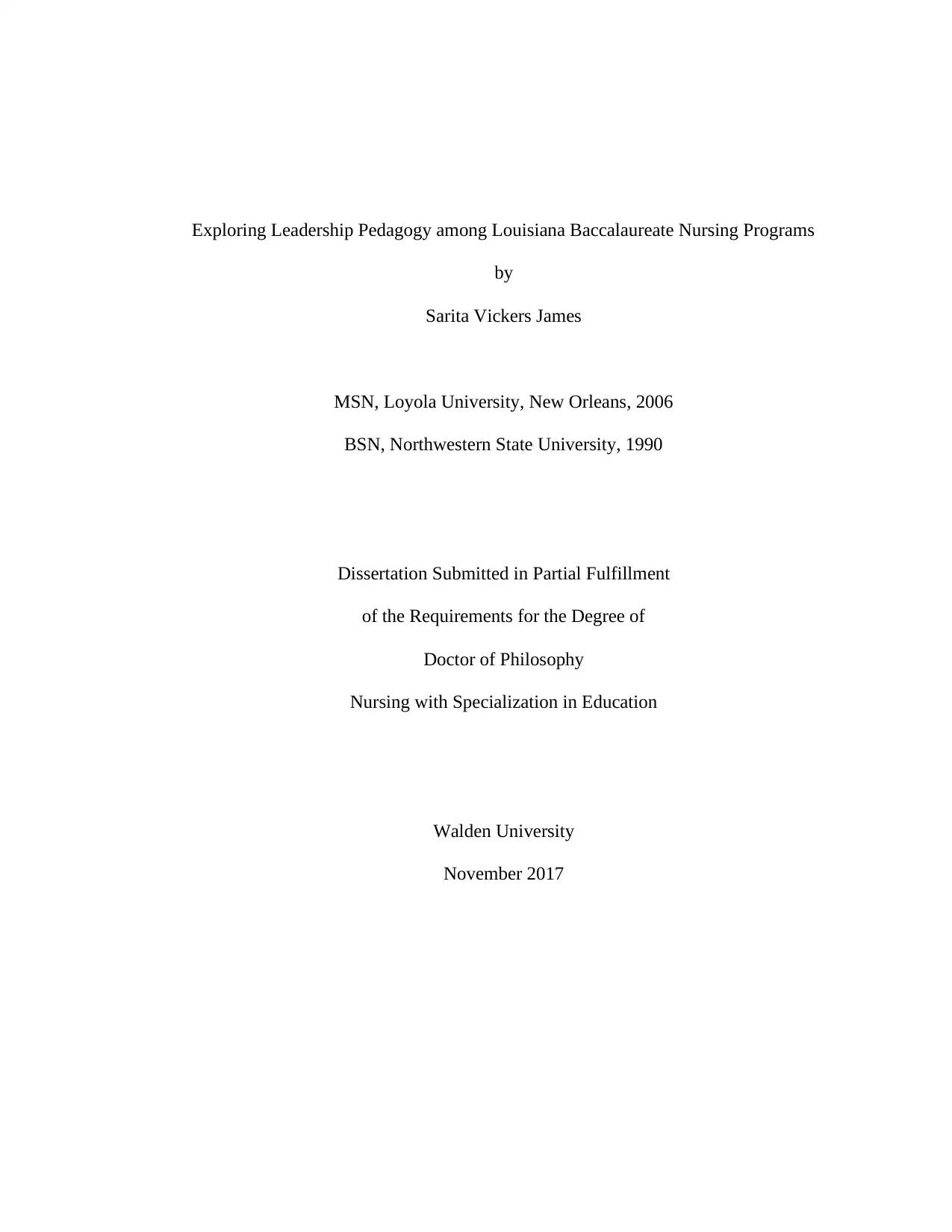
Exploring Leadership Pedagogy among Louisiana Baccalaureate Nursing Programs
by
Sarita Vickers James
MSN, Loyola University, New Orleans, 2006
BSN, Northwestern State University, 1990
Dissertation Submitted in Partial Fulfillment
of the Requirements for the Degree of
Doctor of Philosophy
Nursing with Specialization in Education
Walden University
November 2017
by
Sarita Vickers James
MSN, Loyola University, New Orleans, 2006
BSN, Northwestern State University, 1990
Dissertation Submitted in Partial Fulfillment
of the Requirements for the Degree of
Doctor of Philosophy
Nursing with Specialization in Education
Walden University
November 2017
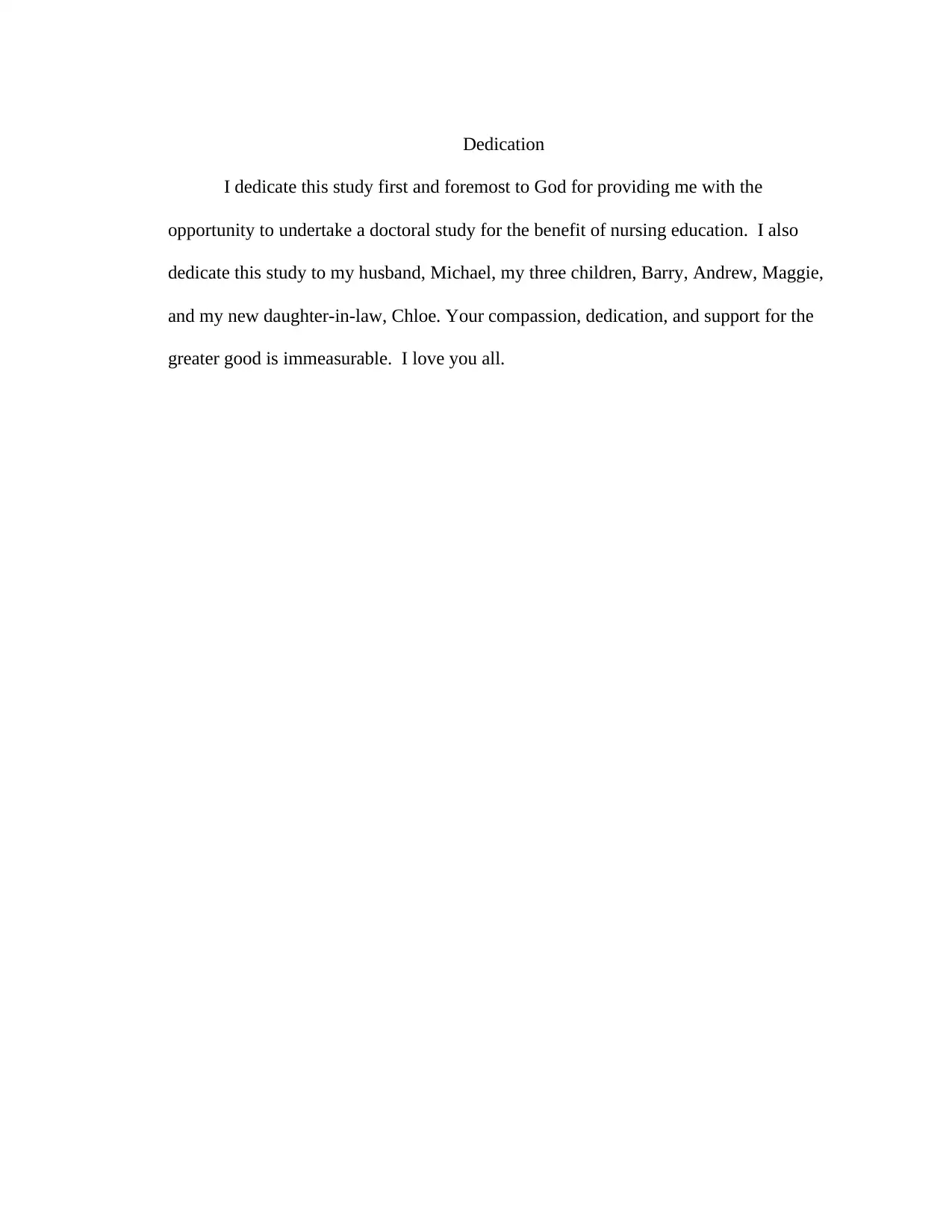
Dedication
I dedicate this study first and foremost to God for providing me with the
opportunity to undertake a doctoral study for the benefit of nursing education. I also
dedicate this study to my husband, Michael, my three children, Barry, Andrew, Maggie,
and my new daughter-in-law, Chloe. Your compassion, dedication, and support for the
greater good is immeasurable. I love you all.
I dedicate this study first and foremost to God for providing me with the
opportunity to undertake a doctoral study for the benefit of nursing education. I also
dedicate this study to my husband, Michael, my three children, Barry, Andrew, Maggie,
and my new daughter-in-law, Chloe. Your compassion, dedication, and support for the
greater good is immeasurable. I love you all.
⊘ This is a preview!⊘
Do you want full access?
Subscribe today to unlock all pages.

Trusted by 1+ million students worldwide
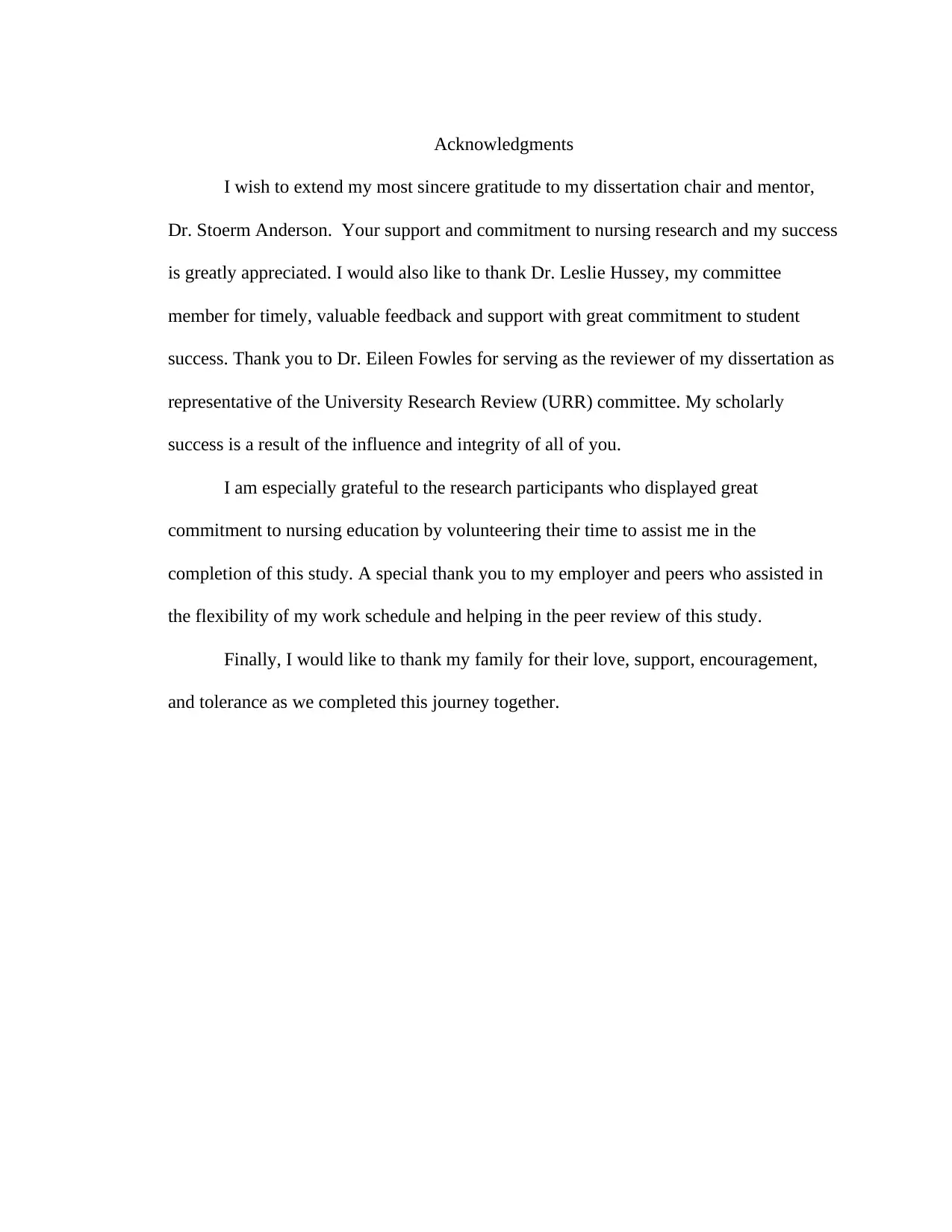
Acknowledgments
I wish to extend my most sincere gratitude to my dissertation chair and mentor,
Dr. Stoerm Anderson. Your support and commitment to nursing research and my success
is greatly appreciated. I would also like to thank Dr. Leslie Hussey, my committee
member for timely, valuable feedback and support with great commitment to student
success. Thank you to Dr. Eileen Fowles for serving as the reviewer of my dissertation as
representative of the University Research Review (URR) committee. My scholarly
success is a result of the influence and integrity of all of you.
I am especially grateful to the research participants who displayed great
commitment to nursing education by volunteering their time to assist me in the
completion of this study. A special thank you to my employer and peers who assisted in
the flexibility of my work schedule and helping in the peer review of this study.
Finally, I would like to thank my family for their love, support, encouragement,
and tolerance as we completed this journey together.
I wish to extend my most sincere gratitude to my dissertation chair and mentor,
Dr. Stoerm Anderson. Your support and commitment to nursing research and my success
is greatly appreciated. I would also like to thank Dr. Leslie Hussey, my committee
member for timely, valuable feedback and support with great commitment to student
success. Thank you to Dr. Eileen Fowles for serving as the reviewer of my dissertation as
representative of the University Research Review (URR) committee. My scholarly
success is a result of the influence and integrity of all of you.
I am especially grateful to the research participants who displayed great
commitment to nursing education by volunteering their time to assist me in the
completion of this study. A special thank you to my employer and peers who assisted in
the flexibility of my work schedule and helping in the peer review of this study.
Finally, I would like to thank my family for their love, support, encouragement,
and tolerance as we completed this journey together.
Paraphrase This Document
Need a fresh take? Get an instant paraphrase of this document with our AI Paraphraser
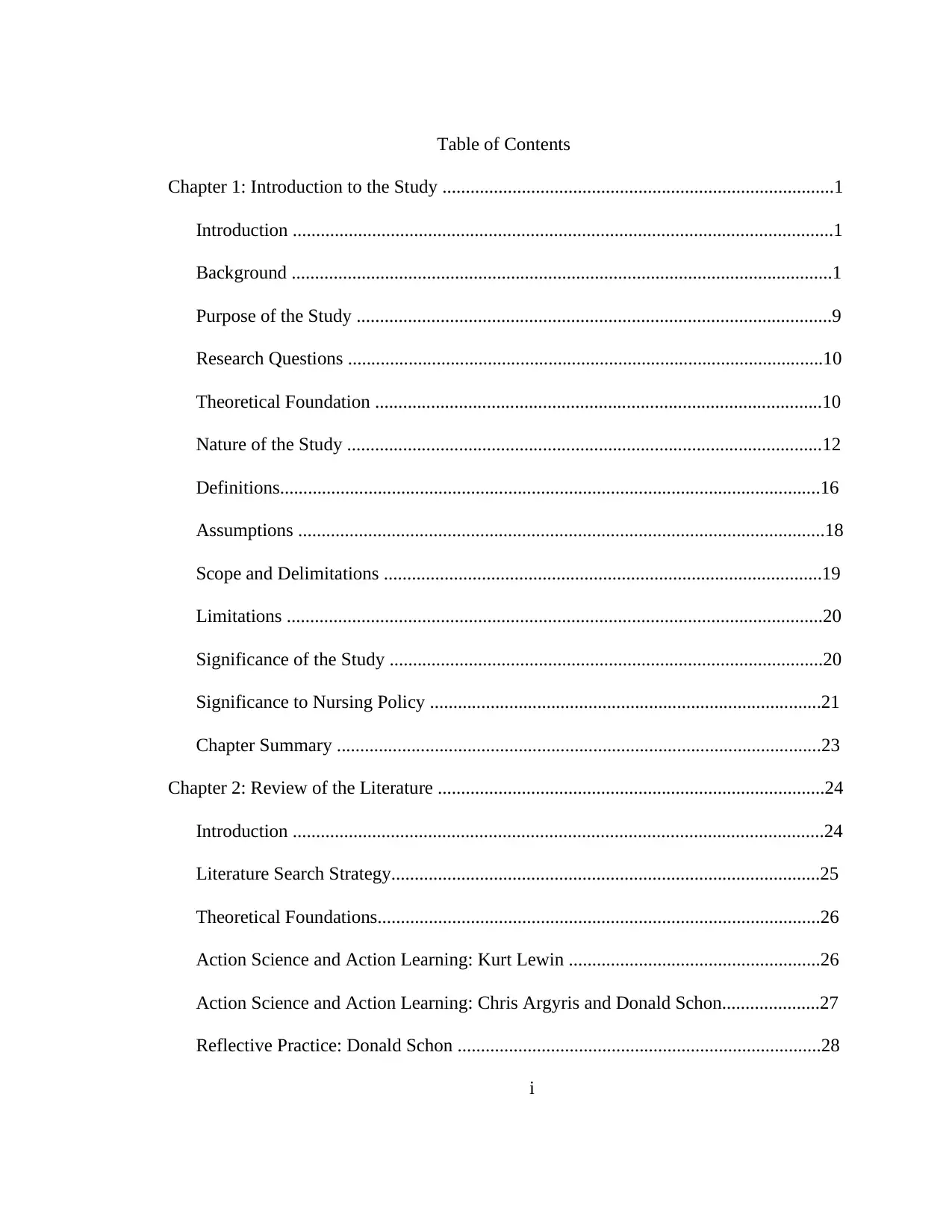
i
Table of Contents
Chapter 1: Introduction to the Study ....................................................................................1
Introduction ....................................................................................................................1
Background ....................................................................................................................1
Purpose of the Study ......................................................................................................9
Research Questions ......................................................................................................10
Theoretical Foundation ................................................................................................10
Nature of the Study ......................................................................................................12
Definitions....................................................................................................................16
Assumptions .................................................................................................................18
Scope and Delimitations ..............................................................................................19
Limitations ...................................................................................................................20
Significance of the Study .............................................................................................20
Significance to Nursing Policy ....................................................................................21
Chapter Summary ........................................................................................................23
Chapter 2: Review of the Literature ...................................................................................24
Introduction ..................................................................................................................24
Literature Search Strategy............................................................................................25
Theoretical Foundations...............................................................................................26
Action Science and Action Learning: Kurt Lewin ......................................................26
Action Science and Action Learning: Chris Argyris and Donald Schon.....................27
Reflective Practice: Donald Schon ..............................................................................28
Table of Contents
Chapter 1: Introduction to the Study ....................................................................................1
Introduction ....................................................................................................................1
Background ....................................................................................................................1
Purpose of the Study ......................................................................................................9
Research Questions ......................................................................................................10
Theoretical Foundation ................................................................................................10
Nature of the Study ......................................................................................................12
Definitions....................................................................................................................16
Assumptions .................................................................................................................18
Scope and Delimitations ..............................................................................................19
Limitations ...................................................................................................................20
Significance of the Study .............................................................................................20
Significance to Nursing Policy ....................................................................................21
Chapter Summary ........................................................................................................23
Chapter 2: Review of the Literature ...................................................................................24
Introduction ..................................................................................................................24
Literature Search Strategy............................................................................................25
Theoretical Foundations...............................................................................................26
Action Science and Action Learning: Kurt Lewin ......................................................26
Action Science and Action Learning: Chris Argyris and Donald Schon.....................27
Reflective Practice: Donald Schon ..............................................................................28
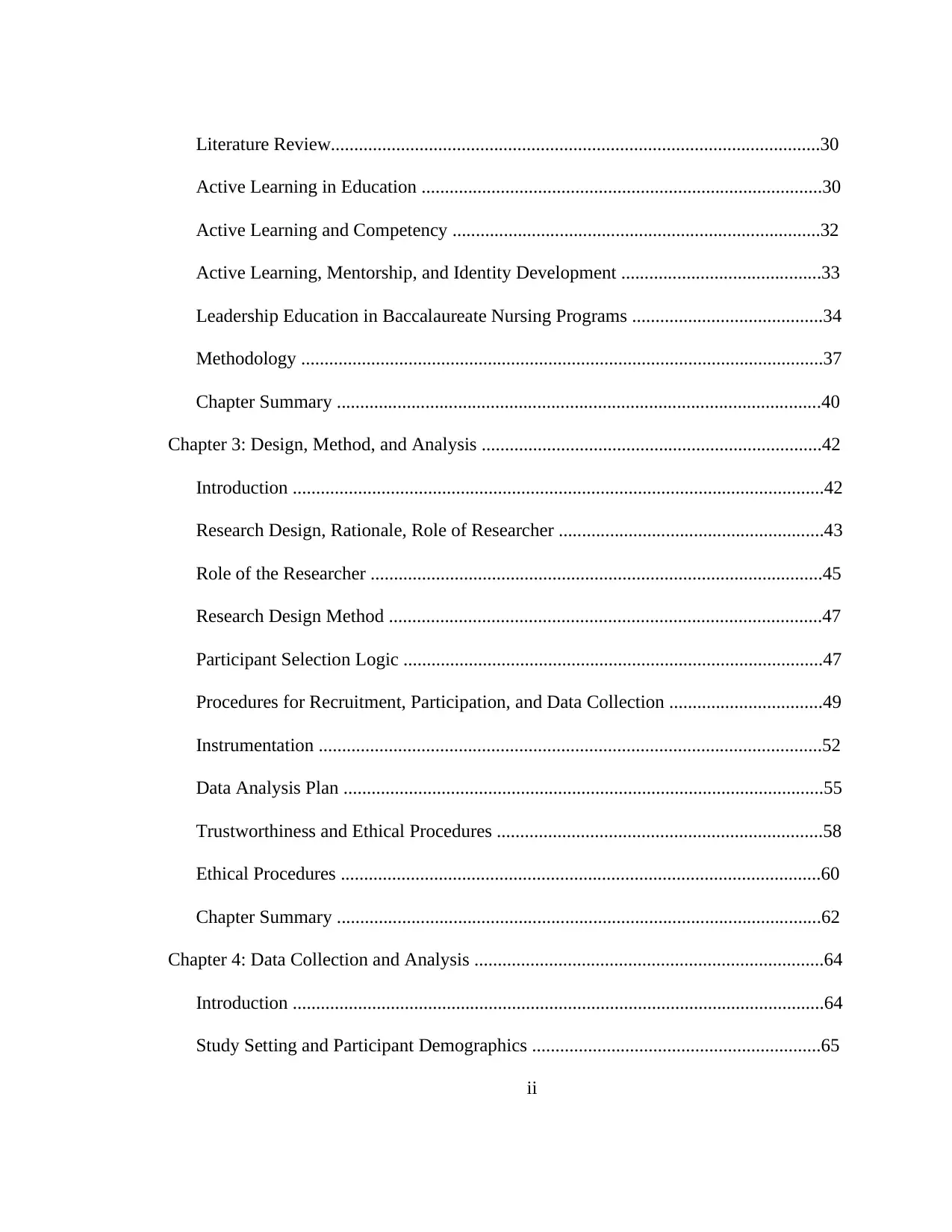
ii
Literature Review.........................................................................................................30
Active Learning in Education ......................................................................................30
Active Learning and Competency ...............................................................................32
Active Learning, Mentorship, and Identity Development ...........................................33
Leadership Education in Baccalaureate Nursing Programs .........................................34
Methodology ................................................................................................................37
Chapter Summary ........................................................................................................40
Chapter 3: Design, Method, and Analysis .........................................................................42
Introduction ..................................................................................................................42
Research Design, Rationale, Role of Researcher .........................................................43
Role of the Researcher .................................................................................................45
Research Design Method .............................................................................................47
Participant Selection Logic ..........................................................................................47
Procedures for Recruitment, Participation, and Data Collection .................................49
Instrumentation ............................................................................................................52
Data Analysis Plan .......................................................................................................55
Trustworthiness and Ethical Procedures ......................................................................58
Ethical Procedures .......................................................................................................60
Chapter Summary ........................................................................................................62
Chapter 4: Data Collection and Analysis ...........................................................................64
Introduction ..................................................................................................................64
Study Setting and Participant Demographics ..............................................................65
Literature Review.........................................................................................................30
Active Learning in Education ......................................................................................30
Active Learning and Competency ...............................................................................32
Active Learning, Mentorship, and Identity Development ...........................................33
Leadership Education in Baccalaureate Nursing Programs .........................................34
Methodology ................................................................................................................37
Chapter Summary ........................................................................................................40
Chapter 3: Design, Method, and Analysis .........................................................................42
Introduction ..................................................................................................................42
Research Design, Rationale, Role of Researcher .........................................................43
Role of the Researcher .................................................................................................45
Research Design Method .............................................................................................47
Participant Selection Logic ..........................................................................................47
Procedures for Recruitment, Participation, and Data Collection .................................49
Instrumentation ............................................................................................................52
Data Analysis Plan .......................................................................................................55
Trustworthiness and Ethical Procedures ......................................................................58
Ethical Procedures .......................................................................................................60
Chapter Summary ........................................................................................................62
Chapter 4: Data Collection and Analysis ...........................................................................64
Introduction ..................................................................................................................64
Study Setting and Participant Demographics ..............................................................65
⊘ This is a preview!⊘
Do you want full access?
Subscribe today to unlock all pages.

Trusted by 1+ million students worldwide
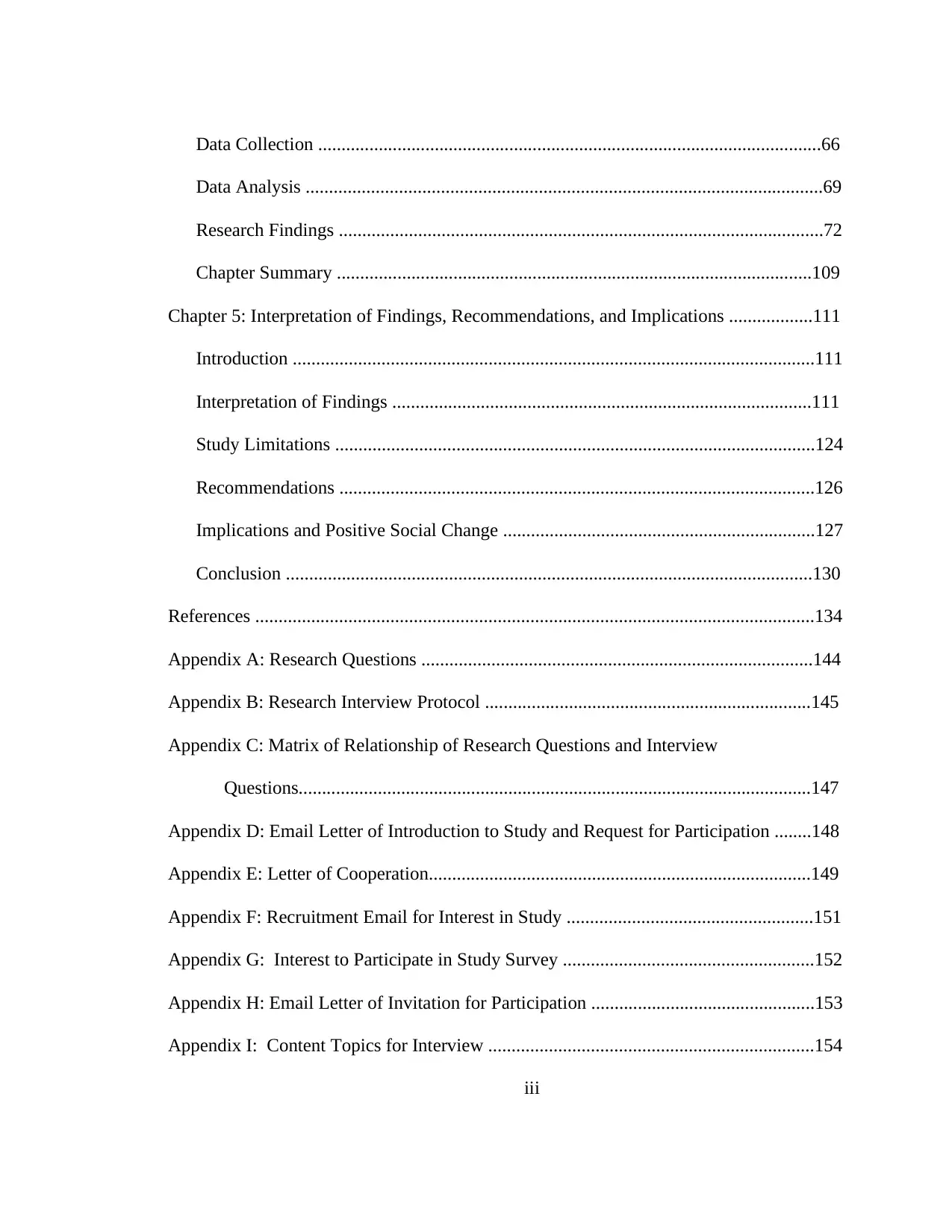
iii
Data Collection ............................................................................................................66
Data Analysis ...............................................................................................................69
Research Findings ........................................................................................................72
Chapter Summary ......................................................................................................109
Chapter 5: Interpretation of Findings, Recommendations, and Implications ..................111
Introduction ................................................................................................................111
Interpretation of Findings ..........................................................................................111
Study Limitations .......................................................................................................124
Recommendations ......................................................................................................126
Implications and Positive Social Change ...................................................................127
Conclusion .................................................................................................................130
References ........................................................................................................................134
Appendix A: Research Questions ....................................................................................144
Appendix B: Research Interview Protocol ......................................................................145
Appendix C: Matrix of Relationship of Research Questions and Interview
Questions..............................................................................................................147
Appendix D: Email Letter of Introduction to Study and Request for Participation ........148
Appendix E: Letter of Cooperation..................................................................................149
Appendix F: Recruitment Email for Interest in Study .....................................................151
Appendix G: Interest to Participate in Study Survey ......................................................152
Appendix H: Email Letter of Invitation for Participation ................................................153
Appendix I: Content Topics for Interview ......................................................................154
Data Collection ............................................................................................................66
Data Analysis ...............................................................................................................69
Research Findings ........................................................................................................72
Chapter Summary ......................................................................................................109
Chapter 5: Interpretation of Findings, Recommendations, and Implications ..................111
Introduction ................................................................................................................111
Interpretation of Findings ..........................................................................................111
Study Limitations .......................................................................................................124
Recommendations ......................................................................................................126
Implications and Positive Social Change ...................................................................127
Conclusion .................................................................................................................130
References ........................................................................................................................134
Appendix A: Research Questions ....................................................................................144
Appendix B: Research Interview Protocol ......................................................................145
Appendix C: Matrix of Relationship of Research Questions and Interview
Questions..............................................................................................................147
Appendix D: Email Letter of Introduction to Study and Request for Participation ........148
Appendix E: Letter of Cooperation..................................................................................149
Appendix F: Recruitment Email for Interest in Study .....................................................151
Appendix G: Interest to Participate in Study Survey ......................................................152
Appendix H: Email Letter of Invitation for Participation ................................................153
Appendix I: Content Topics for Interview ......................................................................154
Paraphrase This Document
Need a fresh take? Get an instant paraphrase of this document with our AI Paraphraser

iv
Appendix J: Content Topics Ranking Matrix .................................................................156
Appendix J: Content Topics Ranking Matrix .................................................................156
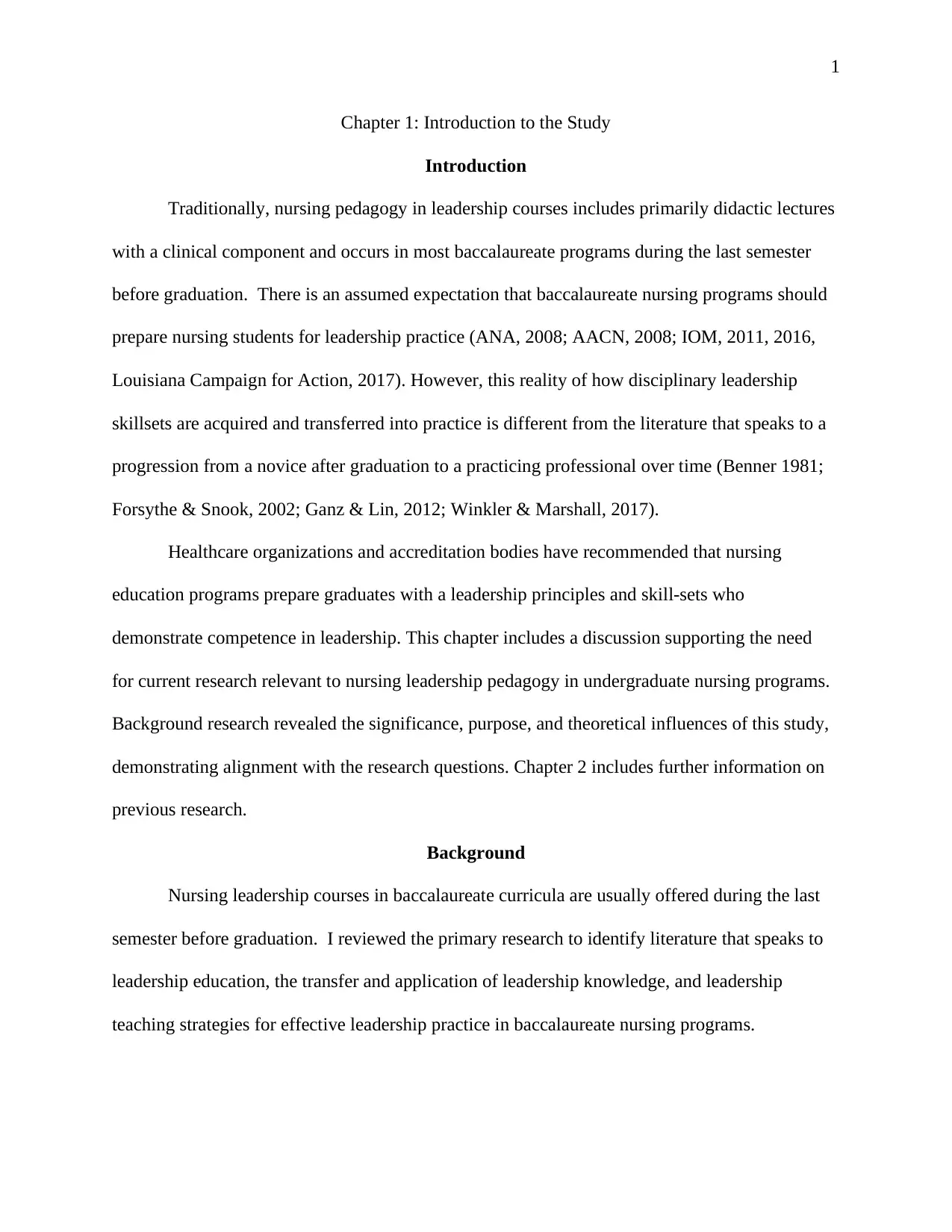
1
Chapter 1: Introduction to the Study
Introduction
Traditionally, nursing pedagogy in leadership courses includes primarily didactic lectures
with a clinical component and occurs in most baccalaureate programs during the last semester
before graduation. There is an assumed expectation that baccalaureate nursing programs should
prepare nursing students for leadership practice (ANA, 2008; AACN, 2008; IOM, 2011, 2016,
Louisiana Campaign for Action, 2017). However, this reality of how disciplinary leadership
skillsets are acquired and transferred into practice is different from the literature that speaks to a
progression from a novice after graduation to a practicing professional over time (Benner 1981;
Forsythe & Snook, 2002; Ganz & Lin, 2012; Winkler & Marshall, 2017).
Healthcare organizations and accreditation bodies have recommended that nursing
education programs prepare graduates with a leadership principles and skill-sets who
demonstrate competence in leadership. This chapter includes a discussion supporting the need
for current research relevant to nursing leadership pedagogy in undergraduate nursing programs.
Background research revealed the significance, purpose, and theoretical influences of this study,
demonstrating alignment with the research questions. Chapter 2 includes further information on
previous research.
Background
Nursing leadership courses in baccalaureate curricula are usually offered during the last
semester before graduation. I reviewed the primary research to identify literature that speaks to
leadership education, the transfer and application of leadership knowledge, and leadership
teaching strategies for effective leadership practice in baccalaureate nursing programs.
Chapter 1: Introduction to the Study
Introduction
Traditionally, nursing pedagogy in leadership courses includes primarily didactic lectures
with a clinical component and occurs in most baccalaureate programs during the last semester
before graduation. There is an assumed expectation that baccalaureate nursing programs should
prepare nursing students for leadership practice (ANA, 2008; AACN, 2008; IOM, 2011, 2016,
Louisiana Campaign for Action, 2017). However, this reality of how disciplinary leadership
skillsets are acquired and transferred into practice is different from the literature that speaks to a
progression from a novice after graduation to a practicing professional over time (Benner 1981;
Forsythe & Snook, 2002; Ganz & Lin, 2012; Winkler & Marshall, 2017).
Healthcare organizations and accreditation bodies have recommended that nursing
education programs prepare graduates with a leadership principles and skill-sets who
demonstrate competence in leadership. This chapter includes a discussion supporting the need
for current research relevant to nursing leadership pedagogy in undergraduate nursing programs.
Background research revealed the significance, purpose, and theoretical influences of this study,
demonstrating alignment with the research questions. Chapter 2 includes further information on
previous research.
Background
Nursing leadership courses in baccalaureate curricula are usually offered during the last
semester before graduation. I reviewed the primary research to identify literature that speaks to
leadership education, the transfer and application of leadership knowledge, and leadership
teaching strategies for effective leadership practice in baccalaureate nursing programs.
⊘ This is a preview!⊘
Do you want full access?
Subscribe today to unlock all pages.

Trusted by 1+ million students worldwide
1 out of 167
Your All-in-One AI-Powered Toolkit for Academic Success.
+13062052269
info@desklib.com
Available 24*7 on WhatsApp / Email
![[object Object]](/_next/static/media/star-bottom.7253800d.svg)
Unlock your academic potential
Copyright © 2020–2025 A2Z Services. All Rights Reserved. Developed and managed by ZUCOL.